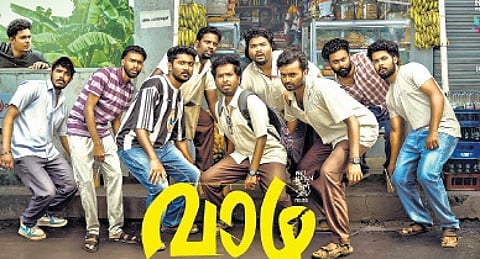

In Malayalam, ‘Vaazha’ simply means a banana tree. But it’s also a derogatory slang word to mock those deemed good-for-nothing. Anand Menen’s new film is a coming-of-age story of a few such ‘vaazhas’, with particular emphasis on their relationships with their fathers. Vishnu (Amith Mohan Rajeswari), Ajo (Siju Sunny), and Moosa (Joemon Jyothir) are the three main ‘vaazhas’, and the narrative traverses their lives together, right from childhood to the late 20s.
The makers opt for a Hindu-Christian-Muslim (like the trio in Premam) representation, perhaps to indicate that family situations are all the same, regardless of the religious background. In a welcome change, it’s the Muslim household that has a more liberal environment than the other two. While all three are troublemakers and poor at studies, Moosa’s father (an excellent Noby) is the only one considerate and warm towards them. After an aimless first half stacked with a sequence of reel-worthy situations, it is the portions exploring the father-son equations that work best in the film.
Like a character in the film says, there are three kinds of students around us: those who pursue their dreams with determination and succeed; those who study well and secure a job according to their parents’ wishes; and then, those without any clue about their studies and future. As the film’s tagline suggests, the primary focus is the billion boys in the third category, who lead a carefree and aimless life.
The decision to cast social media talents as the leads works in the film’s favour as most of these actors are already popular for playing different shades of loafers in their reels. With their vibrant chemistry and ability to churn out humour from everyday moments, they make up for the shallowness in the plot and inconsistency in comedy sequences. The scenes per se don’t guarantee a lot of laughs, but these youngsters manage it with their spontaneous acts, especially Joemon Jyothir, Siju Sunny, and Hashir.
Writer Vipin Das, who smashed misogyny and patriarchy with his fun-yet-thought-provoking Jaya Jaya Jaya Jaya Hey (2022), turns his lens this time towards men. Though not as effective, he still puts some relevant points forward. The constant pressure to live up to parents’ and societal expectations is the most prominent among them. Kottayam Nazeer’s character is a representative of the scores of Malayali parents who compel their children into becoming either an engineer or a doctor, and nothing else.
And what if that doesn’t work out? The instant Malayali solution—move to the Gulf. The film questions all these notions by stressing the importance of one’s personal choices. The performances of seasoned actors like Nazeer, Azees Nedumangad, Noby, and Jagadish add a lot of gravitas to the proceedings and strike the right emotional notes towards the end.
Vaazha is not a film that tries to communicate its ideas visually. Most of it is conveyed through lengthy monologues, voice-overs, and an overpowering background score. Yet, there are some impressive directorial choices like conveying the passage of years through Facebook posts and the intercutting between the father-son episodes in the end. Being a story of boys, the film conveniently sidelines its women.
The only character that shows some promise is Maya, a tomboyish girl who aspires to be like the boys to please her father. Though she also fizzles out soon, it’s interesting how her relationship with Ajo ends citing practical reasons. That’s one good thing about the film. It talks about everyday issues and sticks to the ground realities.
Even in the climax, despite the possibility of a fancy ending, we see the boys’ future still hanging on a thread. The switching shades of a character, who is also once labelled a ‘vaazha’, also suggests how parental pressure is cyclical and there are no instant solutions available.
Movie: Vaazha
Director: Anand Menen
Cast: Joemon Jyothir, Siju Sunny, Amith Mohan Rajeswari, Kottayam Nazeer, Azees Nedumangad, Noby Marcose, Hashir
Rating : 3/5